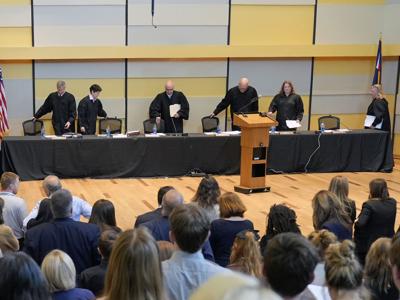A resolution that will ask voters to allow the legislature to pass a retrospective bill tied to sex abuse lawsuits is on thin ice this week, while Senate Democrats try to find the one Republican vote that would allow the proposal to advance.
Senate Concurrent Resolution 1, which was introduced on Jan. 31 and passed its only committee hearing on Feb. 7 on a 3-2 vote, has sat in the Senate, waiting for a second reading debate, for more than two months.
The delay is due to the one thing Senate Democrats don't have: a supermajority of 24 members.
A concurrent resolution, which goes to the ballot, needs at least 24 votes in order to move forward. With 23 Democrats, that means the sponsors, Sens. Rhonda Fields of Aurora and Jessie Danielson of Wheat Ridge, need one Republican to flip — and that has been a tall order.
Initially, SCR 001 had one Republican cosponsor in Sen. Mark Baisley of Woodland Park, who has since withdrawn his support.
The measure, which is opposed by the Catholic Church and insurance companies and supported by trial lawyers and the Colorado Coalition Against Sexual Assault, is tied to a 2021 law passed by the General Assembly that would allow victims of child sex abuse to press legal action years after the abuse took place. The state constitution does not allow legislation that is retrospective — meaning laws that deal with events that took place in the past.
The 2021 law allowed victims to file claims for abuse dating back to Jan. 1, 1960 and through Jan. 1, 2022.
The 2021 legislation received wide bipartisan support. In the House, the bill won 50 "yes" votes and 14 "no" votes, with several Democrats voting against. It secured a 31 to 4 vote in the Senate, with all the "no" votes coming from Republicans.
Almost a year ago, the Colorado Supreme Court ruled the 2021 law unconstitutional, which is what what drove Democratic lawmakers to draft the resolution in front of the Senate this week.
In contrast to 2021, this year's debate has been partisan.
Fields, who was among the sponsors of the 2021 law, told the Senate on Tuesday that SCR 1 would "permit victims of child sex abuse to bring a civil claim regardless of when the abuse occurs," without a statute of limitations.
The state's current limitation is six years and victims who were abused as minors often don't come forward for years, even decades, later, she said.
The people need to make that decision, Fields said.
Senate Minority Leader Paul Lundeen of Monument said senators stand united in condemnation of those who commit crimes against children, especially sex crimes. State law provides for unlimited pursuit of such criminals, he said.
"I've been a staunch advocate for survivors," Lundeen said, noting he has sponsored bills to protect children from sex abuse.
He said the problem with SCR 1 is that it would promote violations of legal protections, tied to the retrospective language in the resolution.
Changing the statute of limitations retroactively could increase penalties and could be viewed as unconstitutional, he said. It also raises due process concerns, as well as undermine trust in the predictability of the legal system, he said.
"To reach far backwards may lead to miscarriages of justice, especially for institutions that may have had absolutely nothing to do with the crimes which we all find so offensive," he said.
Lundeen said he would vote "no" in defense of the constitution.
Sen. Bob Gardner, R-Colorado Springs, who was one of the few "no" votes on the 2021 measure, raised the potential of depriving someone of their rights.
"I could get over that," he said. "But you need to know and understand that these lawsuits don't simply involve the perpetrator," who in these older cases could be dead, in a nursing home or destitute.
That case won't just be against the alleged perpetrator — it could also be against other defendants, such as a school district, that might not have records going back that far nor the finances for it, he said, adding school board members from his district raised that concern with him.
Fields countered that institutions have a responsibility and don't need special protection.
"I want them exposed!" she said.
The focus for both sides has been on one lawmaker: Sen. Perry Will, R-New Castle, as the potential 24th vote to pass it or the 12th vote to kill it. Prior to the Senate's debate on Tuesday, Will said he was contacted by multiple individuals who pleaded with him to vote in favor of the measure.
The measure won a preliminary approval that did not require a supermajority vote. That vote is likely to take place on Wednesday.


(0) comments
Welcome to the discussion.
Log In
Post a comment as Guest
Keep it Clean. Please avoid obscene, vulgar, lewd, racist or sexually-oriented language.
PLEASE TURN OFF YOUR CAPS LOCK.
Don't Threaten. Threats of harming another person will not be tolerated.
Be Truthful. Don't knowingly lie about anyone or anything.
Be Nice. No racism, sexism or any sort of -ism that is degrading to another person.
Be Proactive. Use the 'Report' link on each comment to let us know of abusive posts.
Share with Us. We'd love to hear eyewitness accounts, the history behind an article.